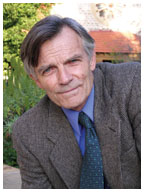
|
September 27, 2006: A moment with...
Photo by Ben Eden/Courtesy American University of Beirut |
John Waterbury ’61
Political economist John Waterbury ’61 taught at the Woodrow Wilson School for nearly two decades before becoming president of the American University of Beirut (AUB), one of the oldest and most prestigious American institutions in the Middle East, in 1998. Waterbury spoke to PAW contributor Katherine Zoepf ’00, who is based in Syria, shortly after the cease-fire between Israel and Hezbollah took effect in August. He had just returned from a trip to the United States, where he met with Bush administration officials to lobby for humanitarian aid, especially for fuel needed to power the university’s teaching hospital. Though the university – viewed as a symbol of stability in Lebanon – was not damaged in the fighting, its hospital treated thousands of refugees. This outpost of American education has not escaped the politics of the region: Its last resident American president, Malcolm Kerr, was assassinated on the campus, and Waterbury told the online publication Insidehighered.com that students affiliated with Hezbollah regularly win election to student government positions.
In August you had a piece in The Washington Post in which you wrote that the issues of Hezbollah, Israel, Palestine, Syria, Iran, and Iraq are all pieces of the same puzzle. Do you see yourself as a voice for Lebanon in the United States?
The conflict between Hezbollah and Israel is part of a bigger problem that goes back to 1967. Unless the United States is ready to go back and look at the whole agenda, we will miss the point of this terrible war.
I published an article in Foreign Affairs in 2002, explaining that most Arabs love American values, but they have huge problems with U.S. policy. President Bush said that these terrorists hate our freedoms and economic system. I said, no, that’s not true! What they don’t like is that we don’t seem to honor those values when we deal with the Middle East.
So there have been two times, 2002 and now, that I’ve spoken up. Both have been times of crisis. But here you are, the head of an institution with “American” in its title, and the president of the United States has launched a war on terror and is talking about axes of evil, and so you’re trying to address that and also to stay afloat in that environment.
What was the role of the university’s hospital during the crisis?
Most of the victims of combat were stuck in the south without any way to get out. We’ve been dealing with the refugee population through outpatient services. In the refugee population you’ve got many people with ongoing medical conditions, people being treated for diabetes or hypertension, people on chemotherapy, all interrupted. If people are trying to go home, we’ll try to follow them until they are able to get back to normal treatment.
Will the university reopen soon?
Everyone wants to get going. We’ll complete our summer schedule ... and start according to our old schedule for the fall, on Sept. 27.
As president, you have increased dramatically the number of Americans at AUB. What will happen because of the conflict?
We went from zero [American professors] to a substantial number, though I don’t know what it’s going to be in the fall. What’s happened here in Lebanon is very discouraging.
Retaining foreign students must be another big issue.
We’re going to take some losses. We’ve always had a solid corps of Jordanian and Syrian students, but we’ve been working hard to get Saudi, Kuwaiti, and Emirati students, and others. But if the families are concerned about security in Lebanon, they’ll relocate the students.
The [American] students who come here for Arabic are adventurous, so this conflict may actually be a selling point! Come, and either see Lebanon collapse, or see Lebanon rebuild. Whatever happens, it will be exciting.
Princeton and AUB have a long history of contact. Could you talk about those ties?
Relations between Princeton and AUB are old and dense. There were twin brothers,
Bayard and Cleveland Dodge, who went to Princeton [both Class of 1909],
and became benefactors of Princeton and AUB. Bayard became the third president
of AUB. [Ed.: Bayard Dodge’s son, David S. Dodge ’45 *49,
was serving as acting president of the university when he was kidnapped
in 1982 and held hostage in Iran for about a year.] There’s a Pliny
Fisk library at Princeton, and Pliny Fisk is associated with AUB. I live
in Marquand House, and of course there’s Princeton’s Marquand
Library. There was a Lebanese cedar planted next to Prospect House. It
was destroyed in a storm several years ago. I mentioned to Shirley Tilghman
that we need to have another. I could bring one myself if the FDA lets
us. It would be wonderful to have a new cedar of Lebanon at Princeton.
![]()

